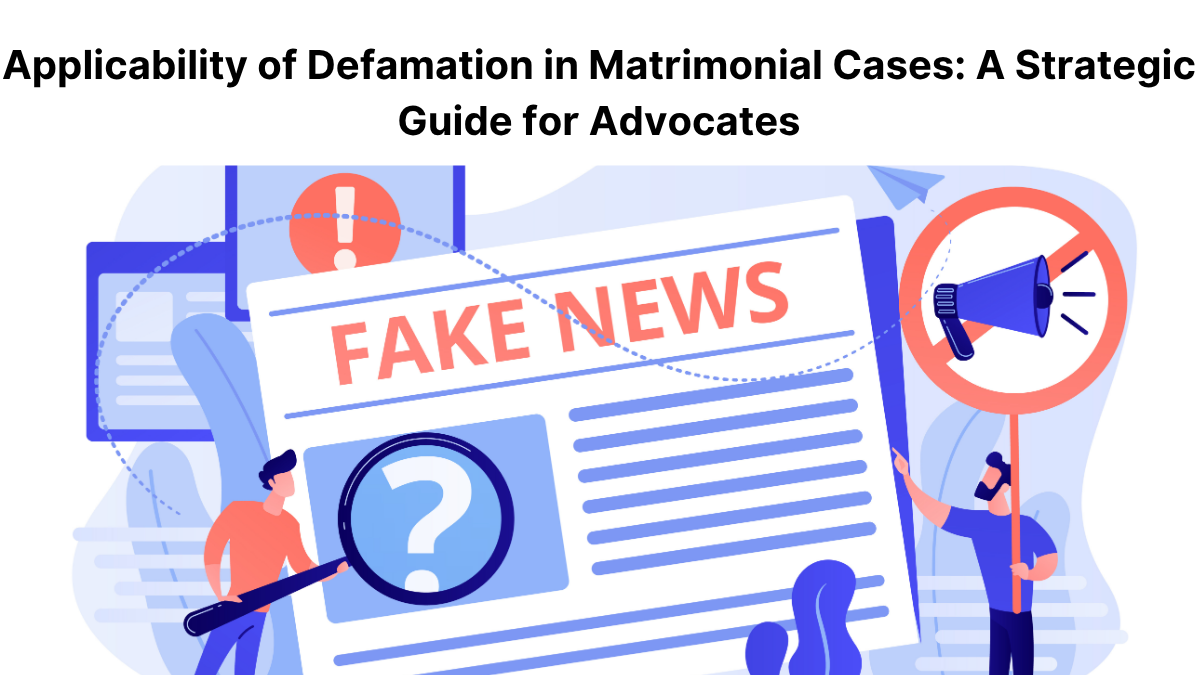
- July 1, 2025
- Kalluri Lakshmi Narasimha Rao
- 498abnsChild CustodyDefamationdivorcefamily courtIndian AdvocatesIPCLegal StrategyMatrimonial Disputes
Defamation in Matrimonial Cases: A Strategic Guide for Advocates
🧭 The Delicate Line Between Allegations and Defamation
In the landscape of Indian matrimonial litigation, emotions often overshadow facts. Spouses may accuse one another of misconduct, cruelty, or even criminal acts—sometimes without substantial proof. For men involved in such disputes, baseless or exaggerated allegations can tarnish their reputation, affecting careers, family ties, and mental well-being.
With the advent of the Bharatiya Nyaya Sanhita (BNS), 2023, replacing IPC, it’s vital for legal practitioners to understand how defamation is defined, defended, and applied under both statutes.
This blog is crafted to mentor Indian advocates, guiding them to protect their clients’ reputation, build strong defenses, and strategically counter defamation claims in matrimonial disputes.
📜 Understanding Defamation in Indian Law
Under IPC, Section 499:
“Whoever, by words either spoken or intended to be read, or by signs… makes or publishes any imputation concerning any person, intending to harm… is said to defame that person.”
Punishment under Section 500 IPC: Up to 2 years imprisonment, or fine, or both.
Under BNS, Clause 356:
While the language is updated for clarity and simplicity, the core essence remains—defamation continues to be:
- Personal, not general.
- Intent-based, not accidental.
- Publication-driven, not private.
⚖️ How Does It Apply in Matrimonial Cases?
✅ When Defamation Applies:
- Filing of false domestic violence cases
- Circulating defamatory statements about the husband and in-laws to friends, employers, and relatives
- Social media posts alleging abuse without evidence
❌ When It May Not Apply:
- Statements made only in the FIR or court proceedings unless shared widely or proven malicious
- Truth spoken in public interest, if substantiated
During or after a divorce or domestic violence case, a woman may:
- File complaints alleging dowry harassment (Sec. 498A IPC).
- Accuse the husband of cruelty (Sec. 304B IPC or Domestic Violence Act).
- Circulate allegations publicly (social media, family circles, legal complaints).
➡️ If these statements are false and damage the husband’s reputation, a case under Section 499 IPC or Section 356 BNS can be made.
🧠 Strategic Mentoring for Advocates: When and How to Act
🎯 1. Identify the Intent and Platform of Defamation
- Was it made publicly? (e.g., FIR copy leaked, social media post)
- Was there a malicious intent or is it just part of the legal battle?
📍 Pro Tip: Obtain certified copies of complaints and media publications for evidence.
🎯 2. Build a Timeline of Events
- Establish that defamation was not “accidental.”
- Show that the accused party (client) was defamed without trial or conviction.
📍 Pro Tip: Compare the complaint date and public sharing date.
🎯 3. File a Complaint Under Section 499 IPC / 356 BNS
- Draft the defamation complaint independently of ongoing matrimonial proceedings.
- Show clear harm to personal, social, or professional reputation.
📍 Pro Tip: Use ready-made draft templates available in Handyy Law Practice Management to save time.
🎯 4. Utilize Civil Remedy for Damages
Apart from criminal charges, you can file a civil suit for defamation and claim monetary compensation.
📌 Case Example:
Kusum Sharma v. Mahinder Kumar Sharma, Delhi HC, 2014
Wife falsely implicated husband in a dowry case, causing career loss. Husband awarded ₹15 lakh in damages.
🔹 Landmark Judgments
🏛️ K. Srinivas Rao v. D.A. Deepa, (2013) 5 SCC 226 — Supreme Court
The Court ruled that false accusations by the wife, amounting to character assassination, were “mental cruelty” and valid grounds for divorce.
🏛️ Mithlesh Kumari v. State of U.P., 2022 SCC OnLine All 246
Allahabad HC quashed 498A case, observing that the wife’s allegations were motivated and defamatory in nature.
✅ Vivek Sehgal v. State & Anr., 2017, Delhi HC
- False allegations under Section 498A IPC
- Court acknowledged damage to petitioner’s dignity
- Permitted defamation case alongside matrimonial trial
✅ Karan Dhingra v. State, 2019, Delhi HC
- Facebook posts by wife defaming husband post-separation
- Held as “prima facie defamatory”
- Trial permitted under IPC Section 500
🛠️ How Handyy Law Practice Management Helps Advocates
🚀 Whether defending a man wrongfully accused or drafting a defamation case:
✨ Handyy Provides:
- 🗃️ Case Law Search (Powered by IndiaKanoon)
Find relevant judgments in seconds. - 📅 Calendar & Case Manager
Never miss a hearing or response deadline. - 📄 Drafting Library (4000+ Ready Templates)
Including criminal defamation, response to DV cases, anticipatory bail, etc. - 🔐 Secure Cloud Storage
Store all sensitive case data with peace of mind. - 📊 Court Fee Calculator
For accurate fee computation for civil suits.
🛠️ Real Impact: Handyy users reported saving up to 40% time in handling multiple cases involving false allegations, evidence management, and document drafting.
🔹 FAQ Section
Q1: Can defamation be filed if the allegations are made in court documents?
A: Not always. If they are shared outside court (to public, media, etc.), defamation may apply.Q2: Can I seek damages in defamation?
A: Yes, you can file a civil suit seeking monetary compensation.Q3: How does Handyy help with case preparation?
A: It helps organize evidence, prepare drafts, and cite relevant judgments seamlessly.
✅ Advocate’s Responsibility in Matrimonial Defamation Cases
Matrimonial disputes can sometimes cross the ethical line. As advocates, our duty lies in upholding truth, dignity, and procedural fairness.
A well-built defamation case, backed by clear facts, proper citations, and a structured timeline, can restore your client’s reputation and act as a deterrent to false allegations.
🚀 Ready to Strengthen Your Legal Practice?
🎁 Get 30 Days Free Access to Handyy Law Practice Management Software
✅ Draft faster
✅ Research smarter
✅ Manage better

